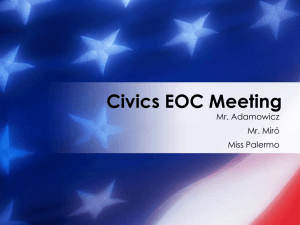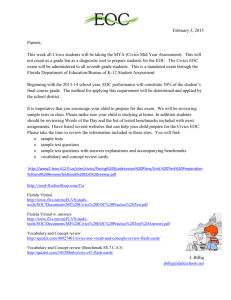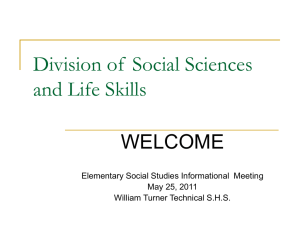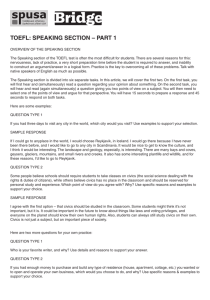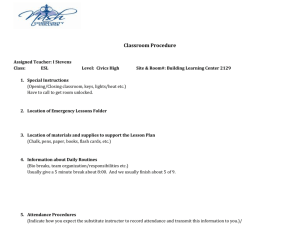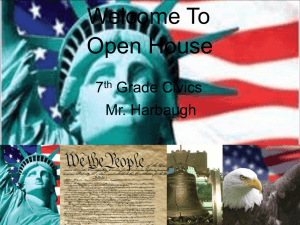Social Sciences Secondary Department Chairpersons' Meeting 9
advertisement
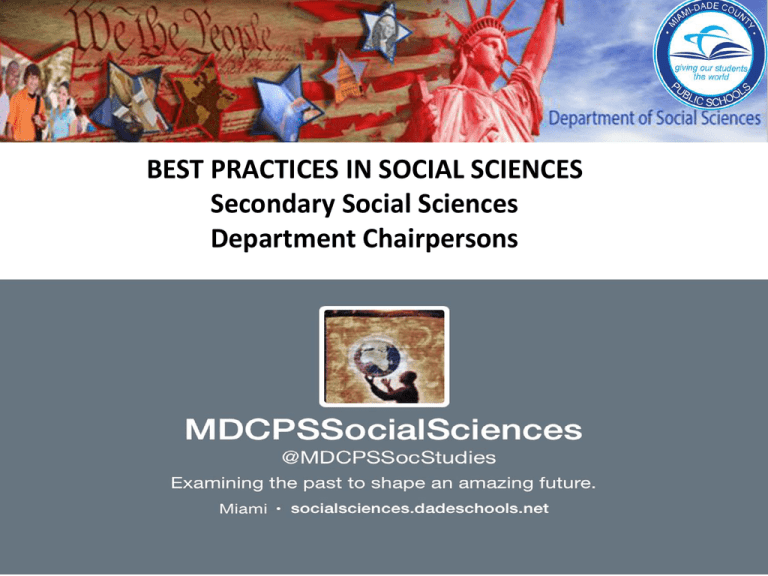
BEST PRACTICES IN SOCIAL SCIENCES Secondary Social Sciences Department Chairpersons AGENDA Topics….. • • • • • • • • • • Social Science curriculum updates. Resources on: M-DCPS Department of Social Sciences Website. Role Social Sciences plays in improving student literacy and writing skills. Social Science EOC’s- How we did? Lessons Learned? Where do we go from here? Special Programs, Curricular Mandates, Instructional Packets, and Competitions Financial Literacy Field Trip Opportunities Pedagogy- Overview of Best Practices Department Chairpersons’ Expectations My Learning Plan Overview of Website www.socialsciences.dadesch ools.net Look for: – – – – – – – – – Current News Pacing Guides/ Lessons Quick link icons Best Practices Quick Start Weekly Briefings Civics & U.S. History Modules Digital Projects Instructional Packets Documents Overview of Website- new this year www.socialsciences.dad eschools.net Look for: • Civics in a Snap K-5 • History Labs (6, 7, 8, 9, 11) • Local History • Digital Projects for 8th grade (plus 7th and 9th from 2014-15). Support Modules: NEED MORE TRAFFIC! Look for under Current News: • Civics EOC Middle School Support Modules • U.S. History High School Support Modules Support Modules: Sample Module 1: Civics Support Modules: Sample Module 1: U.S. History Overview of Website- Weekly Briefings www.socialsciences.dadesch ools.net Look for: • PD Announcements • Program Updates • Competitions • Instructional Resources • EOC Updates • Special Events • 29 thus far! Overview of Website- Weekly Briefings 7th grade Civics EOC Updates • Briefing #18085 • 7th grade Civics EOC Reminders and Updates Overview of Website- Weekly Briefings 11th grade U.S. History EOC Updates • Briefing #18084 • 11thgrade U.S. History EOC Reminders and Updates Pacing Guide Overview • • Pacing guides for social sciences courses can be found on our website socialsciences.dadeschools.net Pacing guides include: – – – – – – Course description Highlighting to emphasize key benchmarks General Internet resources Course themes History Lab instructions Breakdown of topics to be taught: • • • • • • • Topic name Pacing and dates Essential questions Essential content Benchmarks Links to lesson plans and history labs, if applicable Instructional tools: – – – – – FL Standards activity Vocabulary Technology links Suggested activities Assessment, ELL, etc. – Links to Discovery Ed. resources by topic – Links to NBC Learn resources Scavenger Hunt Activity • Use the Social Sciences website and the pacing guide for your grade level and subject area to answer the scavenger hunt questions. • Best Practice: Have your department members do the scavenger hunt to familiarize themselves with the format/structure/resources of the pacing guides. • You can find the scavenger hunt, along with this presentation, under Current News: Secondary Department Chairpersons. Digital Convergence www.socialsciences.d adeschools.net Alsohttp://digital.dadesch ools.net Look for: • Lessons/projects embedded into 7th, 8th, and 9th grade pacing guides. • Discuss Best Practices. What are the Literacy Florida Standards? 1. Balancing Informational and Literary Text 2. Building Knowledge in the Disciplines in the 1 & 2: Non-fiction Texts Authentic Texts 3: Higher Level of Text Complexity Paired Passages 4&5: Focus on command of evidence from text: rubrics and prompts 6: Academic Vocabulary 3. Staircase of Complexity 4. Text-based Answers 5. Writing from Sources 6. Academic Vocabulary Defining the Literacy Balancing Informational & Literary Text Knowledge in the Disciplines Students read a true balance of informational and literary texts. (SS example: students read a historian’s account of Florida’s role in the Civil War). Shift 3 Staircase of Complexity Students read the central, grade appropriate text around which instruction is centered. Teachers are patient, create more time and space and support in the curriculum for close reading. (SS example: Instruction MAY require students to read same text multiple X’s) Shift 4 Text-based Answers Students engage in rich and rigorous evidence based conversations about text. (SS example: Questions are about the TEXT) Shift 5 Writing from Sources Writing emphasizes use of evidence from sources to inform or make an argument. (SS example: In written response to an essential ?, students must use evidence from text) Shift 6 Academic Vocabulary Students constantly build the transferable vocabulary they need to access grade level complex texts. This can be done effectively by spiraling like content in increasingly complex texts. (SS example: Civil War relevant vocabulary from text is learned through the text analysis experience). Shift 1 Shift 2 Students build knowledge about the world (domains/ content areas) through TEXT rather than the teacher or activities (SS example: The Civil War text/account is the base of instruction) EOC’s- Full Implementation How did we do? 7th grade Civics EOC 7th grade Civics EOC- by course FL_COURSE_ABBR_TITLE M/J Civics M/J Civics & Car Pl M/J Civics Adv M/J Civics Adv, Gifted M/J Civics Adv & CP M/J Civics Adv&Car P M/J Civics CCR Number Tested % L3-5 5358 8471 3667 1844 1329 4832 5 42% 37% 83% 96% 94% 85% 0% How did we do? 11th grade U.S. History EOC 11th grade U.S. History EOC- by course EOC . . . Lessons Learned 2015-16 Academic Year • Starting 4th year for US History • 30% of student’s grade • Weekly briefing 18084 • Starting 3rd year for Civics • 30% of student’s grade • Weekly briefing 18085 It is simple… • Use the item specifications to drive instruction • Stimuli-driven instruction based on the item specs Planning is essential… • Planning is essential for strategic instruction • Planning should take place by using an array of resources • But using the Item Specs is pivotal There is no magic resource… • No one resource will work alone • Every resource has its purpose • It is up to the teacher to determine what combination to use based on their students’ needs Item Specs Data-Driven Instruction McGraw Hill Resources U.S. History History Labs & Other Best Practices Gateway Escambia Item Specs Data-Driven Instruction McGraw Hill Resources Civics FL Resources Gateway iCivics Escambia & FLREA Resources History Labs & Other Best Practices Differentiated Instruction is needed… • Data shows an alarming discrepancy between Honors/Advanced and Regular EOC’s in Social SciencesFuture Goals Special Programs, Competitions, Instructional Packets, & Legislative Mandates State Mandates & Competitions Resources Packets • • • • • • Overview of Mandates African American History Character Education Hispanic Contributions to U.S. History Holocaust Education Women’s Contributions to U.S. History Note: Best practice means the infusion of these important topics and concepts throughout the entire year and special recognition during celebratory months. Hispanic Contributions to the United States • Lesson Plans / Resource Guides/ Power Point (#18063) • Hispanic Heritage Essay Contest in Cooperation with Nova Southeastern University (#18088) • 1st Annual Hispanic Heritage Read in Chain (#18092) • 1st Annual Hispanic Heritage Oratorical Competition (#18093) • Hispanic Heritage Education Advocates (#17980) African American History • Competitions: Theodore Gibson Oratorical Competition, African American Read in Chain, Black History Month Essay Contest, Black History Culture and Brain Bowl • Lesson Plans: Connected to grade level benchmarks • School Action Plan/Advocates • Resources: Connected to grade level benchmarks Women’s History/Contributions to U.S. History • • • • Read-in chain Essay Contest Oratorical Contest Annual publication of instructional resources Holocaust Education • • • • • Remembrance Days Packet Treblinka's Last Witness Resources Eli Wiesel Essay Contest Florida Jewish History Month Multiple Professional Development Opportunities Character Education • • • • Curriculum Professional Development Parent and Family Involvement Service Learning • • • • • • • • Competitions Geography Bee and History Bee Mock Trial Model United Nations Project Citizen We the People Black History and Culture Brain Bowl Theodore Gibson Oratorical Competition Various essay contests commemorating special events/initiatives • • • • • Instructional Packets: Published thus far Patriot Day (#17983) Hispanic Heritage Month (#18063) Constitution Day (#18086) Celebrate Freedom Week (#18089) Coming Soon- Veterans’ Day and Native American History Month in November Voter Registration (SHS Slide Only) Best practices! Instructional Packets: Also posted under current news For a complete list of programs, special projects, competition with descriptions and activity month- see chart on Department’s website: Field Trip Opportunities from our Partners: Financial Literacy Financial Literacy Financial Literacy Instructional Resources from Everfi Now in Pacing Guides for the following grade levels (addendum included at the end of each 9 weeks): 4th grade Florida History 5th grade U.S. History 6th grade World History 7th grade Civics (only to be taught AFTER EOC) 8th grade U.S. History 9th grade World History 11th grade U.S. History (only to be taught AFTER EOC) 12th grade Economics (infused throughout entire course). Financial LiteracySample Addendum Financial Literacy- the need Mr. David Bianchi: Author- Blue Chip Kids Financial Literacy- Future plans Coming Spring 2016: Two to three week instructional units to be implemented K-11 post- standardized testing season at the end of the academic year. Best Practices Overview PRIMARY SOURCE DOCUMENTS Stimuli-Based Instruction Definition: The use of primary or secondary sources of information, emphasizing content/ skills explicitly stated in standards/ benchmarks, to increase student content knowledge, analytical skills, and engagement. (e.g. political cartoons, graphs, quotes, etc.) Social Science Best Practices Stimuli-Based Instruction (more examples) Library of Congress Resources Access teacher’s guides and tools for students to use when analyzing various types of stimuli from the LOC website: https://www.loc.gov/ teachers/usingprimar ysources/guides.html C-E-R Claim-Evidence-Reasoning Definition: Requiring students to state a claim (e.g. an answer to a question), provide evidence to support the claim, and state a reason why the evidence answers the question. Let’s Apply Inference/Observation Skills to Social Studies Directions: Place an ‘I’ before the statements that are inferences and an ‘O’ before the statements that are observations OR you may wish to make a T-chart. 1. There are no women in the painting. 2. The men are signing some sort of document. 3. This is a very important event. 4. These men are very important people. 5. George Washington is depicted in the painting. Claim Evidence Reasoning Sample Student Response • Claim: This painting shows an important event. • Evidence: George Washington is in the painting and is considered the father of our country and an important historical person. • Reasoning: Since the attention is on the signing of the paper and George Washington, an important person in U.S. history, is in the painting, it is logical to assume that this painting is about an important event. It is also logical to think that the signing of this paper or document had an important impact on history. Using CER to Analyze Stimuli C-E-R • Make a CLAIM • Give EVIDENCE • Explain REASON Practice using CER with the political cartoon. • Discuss: How can this activity be used in your class? Social Sciences Best Practices SAMPLE: Correct Answer C-E-R: Claim, Evidence, Reasoning I CLAIM that FSeparation of Powersis the correct answer. The EVIDENCE I have is that in the box, it says that if all power is in one place, NO liberty or freedom exists. The REASON that this evidence supports the answer is that separation of powers is a key part of the Constitution which divides power among the 3 branches of government. MYA- Post Assessment Item Analysis SAMPLE: Wrong Answer C-E-R: Claim, Evidence, Reasoning I CLAIM that choice IFederalism- is the correct answer. The EVIDENCE I have is that in the box, it mentions all 3 branches of governmentlegislative, executive, judicial. The REASON that this evidence supports the answer is that Federalism refers to the three branches of government. Teacher or Student Feedback: Choice I is incorrectFederalism refers to shared powers between levels of governmentlocal, state, federal. CER Sample: Correct Answer I CLAIM that Bthe power of big businesses during the Second Industrial Revolution - is the correct answer. The EVIDENCE I have is that in the cartoon it shows a child labor employer holding down child workers. The REASON that this evidence supports the answer is that many big businesses during the Second Industrial Revolution used child labor, and child labor was a major social issue of the day. CER Sample: Wrong Answer I CLAIM that Athe power of political machines during the Second Industrial Revolution - is the correct answer. The REASON that this evidence supports the answer is that political machines during the Second Industrial Revolution were too powerful and often abused their power by taking advantage of people. Teacher or Student Feedback: Choice A is incorrect- Political machines were an issue during the Second Industrial Revolution, but since the hand in the cartoon says “Child Labor Employer” it relates to big businesses. The EVIDENCE I have is that in the cartoon it shows a very powerful hand holding people down. C-E-R Rubric Use the rubric to evaluate C-E-R responses. History Labs Social Science or History Labs are an engaging and rigorous instructional approach designed to require in-depth learning and thinking on the part of the student guided by an essential question, analysis of primary or secondary source documents, and ending in a rigorous writing assignment or other rigorous learning task. Look for this logo on our website (http://socialsciences.dadeschools.net) and in the pacing guides for ready-made history labs. A New Era in Social SciencesTo Rigor and Beyond…………… Social Science Lab Steps: 1. Develop overarching/essential question. 2. Build background knowledge. 3. Conduct document analysis. 4. Take the learning task to the end- e.g., writing activity or other rigorous learning task. A New Era in Social SciencesTo Rigor and Beyond…………… Social Science Lab Steps: 1. Develop overarching/essential question. 2. Build background knowledge. 3. Conduct document analysis. 4. Take the learning task to the end- e.g., writing activity or other rigorous learning task. A New Era in Social SciencesTo Rigor and Beyond…………… Sample Lab: Please note template. Secondary Department Chairpersons: Best Practices and Expectations • Communicate, communicate, communicate! • Have a read aloud (until teachers become accustomed to reading information on their own) • When asked a question that has been answered (multiple times): Walk them through the steps to find the information on Department’s website. Share the wealth!!! This presentation (and more to come) posted here: Share the wealth!!! This presentation (and more to come) posted here: A New Era in Social SciencesTo Rigor and Beyond…………… Social Science Fund RaiserSupport Your Social Science Department- Order your Department of Social Sciences Shirt! $25.00 Pick up your flyer and order form on your way out. ALL ORDERS AND CHECKS MUST BE RECEIVED BY: 10-30. A New Era in Social SciencesTo Rigor and Beyond…………… My Learning Plan: 2 main parts- complete the evaluation and the follow up assignment. ALL FOUND IN THE TEAM ROOM! Click on Team Room A New Era in Social SciencesTo Rigor and Beyond…………… My Learning Plan: 2 main parts- complete the evaluation and the follow up assignment. ALL FOUND IN THE TEAM ROOM! Click on Instructional Evaluation Click on Follow Up and Instructions for Sharing Files Team Social Sciences- one team- one message: Improve student achievement! District Department of Social Sciences Mr. Robert C. Brazofsky, Executive Director Phone: 305 995-1982 E-Mail: rbrazofsky@dadeschools.net Dr. Sherrilyn Scott, Supervisor Phone: 305 995-1971 E-Mail: sherrilynscott@dadeschools.net Ms. Jackie Viana, Supervisor Phone: 305 995-2772 E-Mail: jviana@dadeschools.net Dr. Miriam Klein Kassenoff, Holocaust Education Phone: 305 995-1201 E-Mail: mkassenoff@dadeschools.net Mr. Nicolas Valdes, CSS Phone: 305 995-1781 E-Mail: nicolasvaldes@dadeschools.net Ms. Kelly Webner, CSS Phone: 305 995-2352 Email: kwebner@dadeschools.net Support Staff Mr. Michel Delgado, Senior Computer Operator Phone: 305 995-1469 E-Mail: mdelgado4@dadeschools.net QUESTIONS? Follow us on Twitter!
